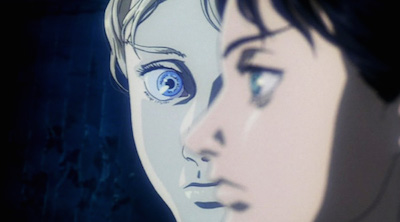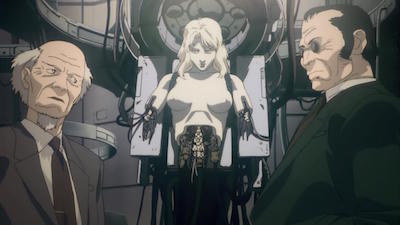
Next month, the American adaption of Ghost in the Shell will arrive in theaters. There has been much chatter surrounding the casting of Scarlet Johansson as Major Motoko Kusanagi (I would have prefered Rinko Kikuchi myself.) I expect there will be more to say after its release.
I first saw the 1995 animated film Ghost in the Shell in 2004 when its sequel Ghost in the Shell: Innocence was released. I absolutely loved the original film; I’m a total sucker for philosophical discussions on the nature of reality. However, it’s been over ten years since I first watched it so I figure I better revisit it so I can tell you how this new film has screwed it up.
It turns out that the original Ghost in the Shell has a lot more to say about nationality, race and identity than I expected.
[Warning: Contains Spoilers for the 1995 film]
The 1995 Ghost in the Shell film tells the story of Section 9, a Japanese special security force tasked with anti-terrorism and corruption enforcement. Section 9 needs to capture the elusive hacker the Puppet Master who can infiltrate the minds of cyborgs.
One detail I had completely forgotten about is that Section 9 suspects that the Puppet Master is American. In other words, our heroes in this film are trying to protect Japan from being infiltrated by an American terrorist. That certainly puts the new American adaptation that’s headlined by a white American actress in a whole new light. Who exactly will “Major” be in this new film? We do know that Japanese actress Kaori Momoi will be playing Major’s mom which seems to indicate that Scarlet’s Major might not necessarily be American.
But the 1995 film doesn’t stop there.
When Section 9 finally does find the Puppet Master, they find him in the shell of a cyborg woman.

When Batou and Major Kusanagi come to examine the shell, they are shaken by what they see. Batou remarks that the shell was made by the same corporation that has created many of Section 9’s cybernetics–which means that the Puppet Master could hack into nearly everybody in Section 9 and control them. Moreover, the shell isn’t just any shell, but it’s the exact same shell model that Major Kusanagi uses. Unlike Batou, Major Kusanagi has a fully cyborg body except for her ghost. When she looks at the Puppet Master, she sees herself. She wonders out loud if her ghost is even her real ghost.
We learn that the Puppet Master isn’t exactly an American and isn’t exactly a human either. Section 9 understands that the Puppet Master is an A.I. project gone rogue. Puppet Master responds that he is not A.I. but a life form created from vast amount of information. The film seems to ask: What is identity when your body is meaningless? What if there’s a vast amount of information at your fingertips? What is definite when the mind is limitless?

At the end of the film, the Puppet Master makes Motoko an offer. The Puppet Master cannot die nor reproduce. He wishes to merge himself with Motoko’s ghost so that he will cease to exist yet create something new. She agrees. Motoko emerges with her personality and memory intact and has gained the ability to travel through any network. She is no longer confined to a shell.
It’s hard to say if the American adaption of Ghost in the Shell will have anything interesting to add to these questions of identity. If the original Ghost in the Shell questions a Japanese identity in a future world where everything is connected, how will a white American actress question the identity of America?
Images via myanimelist, ganriki.org
so if major willingness to merge with the puppet master gives the message that she is willing to shed her identity for a greater purpose/more power/just something different.
then isn’t this an anti identity politics message? if we want to live in a true global liberal free society then tribalism shouldn’t be embraced and well white chicks should be able to play Asians.
I think having a white American actress play Major might be more indicative of how we don’t want to shed identity even in our globalized, technological world. The more things change, the more things stay the same, you know?